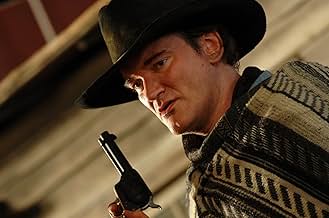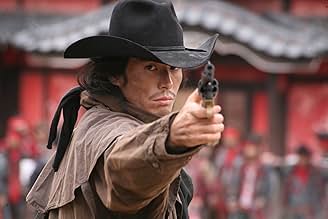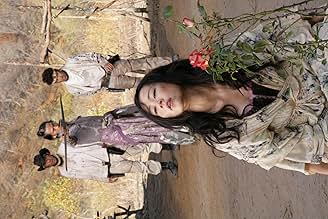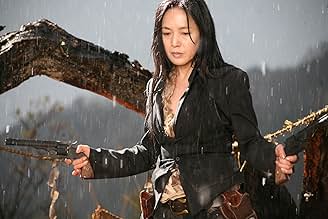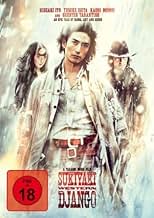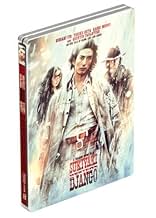VALUTAZIONE IMDb
6,1/10
16.139
LA TUA VALUTAZIONE
Un pistolero senza nome arriva in una città dilaniata da bande rivali e, sebbene corteggiato da entrambi, sceglie la sua strada.Un pistolero senza nome arriva in una città dilaniata da bande rivali e, sebbene corteggiato da entrambi, sceglie la sua strada.Un pistolero senza nome arriva in una città dilaniata da bande rivali e, sebbene corteggiato da entrambi, sceglie la sua strada.
- Regia
- Sceneggiatura
- Star
- Premi
- 4 vittorie e 5 candidature totali
Recensioni in evidenza
A strange movie, I must say. But before I go into the movie itself, I feel the need to talk about the case.
That's why I actually bought this movie, originally. Because the case was so...pretty. And Quentin Tarantino's name on it sealed the deal for me. The cover design is so well done and beautiful and artistic and many other synonyms of those, which provides the perfect segue into the movie itself.
It starts out with, of all people, Quentin Tarantino. The background is noticeably fake, a setting sun over the horizon painted onto a backdrop. I was a bit taken aback, at first, and I never really understood why, but I rolled with it. With the first words spoken, however, it became painfully apparent what this movies main problem would be.
You see, despite the fact that almost all of the cast uses Japanese as their primary language (I haven't verified this, but it's pretty obvious), the filmmaker, Takashi Miike, shot the whole thing in English. Thankfully, there are subtitles, but the lack of understandable speech presents a great barrier. It's basically the story of two clans, the Heike, led by Kiyomori/Henry (Kōichi Satō), and the Genji, led by Yoshitsune (Yūsuke Iseya), that are battling over a town for a fabled treasure. A mysterious stranger (Hideaki Ito) rolls into town, much like Clint Eastwood in those old movies that we love oh-so-much. This is a beautifully done movie, with many breathtaking scenes, exciting, lovable characters (for the most part), and plenty of blood and gore. Oh, and a rape, so keep the kiddies away from this one.
That's why I actually bought this movie, originally. Because the case was so...pretty. And Quentin Tarantino's name on it sealed the deal for me. The cover design is so well done and beautiful and artistic and many other synonyms of those, which provides the perfect segue into the movie itself.
It starts out with, of all people, Quentin Tarantino. The background is noticeably fake, a setting sun over the horizon painted onto a backdrop. I was a bit taken aback, at first, and I never really understood why, but I rolled with it. With the first words spoken, however, it became painfully apparent what this movies main problem would be.
You see, despite the fact that almost all of the cast uses Japanese as their primary language (I haven't verified this, but it's pretty obvious), the filmmaker, Takashi Miike, shot the whole thing in English. Thankfully, there are subtitles, but the lack of understandable speech presents a great barrier. It's basically the story of two clans, the Heike, led by Kiyomori/Henry (Kōichi Satō), and the Genji, led by Yoshitsune (Yūsuke Iseya), that are battling over a town for a fabled treasure. A mysterious stranger (Hideaki Ito) rolls into town, much like Clint Eastwood in those old movies that we love oh-so-much. This is a beautifully done movie, with many breathtaking scenes, exciting, lovable characters (for the most part), and plenty of blood and gore. Oh, and a rape, so keep the kiddies away from this one.
Reading some of the reviews, I am surprise that others are confused as to the story. It is basically a samurai movie made as a Japanese western with Japanese cowboys instead of samurais. The story is almost the same as Yojimbo/A Fistfull of dollars. Stranger comes into town and gets the 2 opposing gangs to start killing each other. The difference being he has a sidekick in the kick ass Bloody Benten (female gunslinger). I think what makes everyone go "huh?" is its rather confusing opening with Quentin Tarantino and also the dialogue in heavily Japanese accented and enunciated English. It is rather jarring and does distract from the story. However if you have watched enough undubbed samurai movies you will be familiar with the style and delivery of the dialogue so the distraction goes away. The movie is nothing original but based on it simply being a gunfight movie its not bad.
If you've seen "High Plains Drifter", "The Good, The Bad and The Ugly" any other Leone films or "spaghetti westerns" you will appreciate this film. (I guess this is an "udon western"? Sorry, I had to throw that in there.) For those who have not, you may not understand why the film goes to such extremes throughout the scene sequences. Everything from the bumbling sheriff to the mindless and spineless random gang characters as well as the leader of the 'reds', offer comedic escapades that are quite hysterical. Then we swing to the very dramatic and tragic scenes of loss, murder, pillaging and revenge. Japanese themes and references are inherent because the director is well...Japanese! The dialogue is all English and purposely so. I'm not sure if this was for comedic reasons or to reach out to a larger audience, but it is effective and an interesting choice on Miike's part. It is subtitled which, depending on how you view it, either detracts or adds to the film. It does help in some cases, but in my opinion, I think it would have been better to leave it out altogether. Overall, its a very fun film but expect to be taken up and down emotionally. Production, cinematography, scenery, costumes, art direction and sound design aren't even worth mentioning because they're all done so well, you don't notice them. Its about as close as you can get to a Western-Samurai Japanese-Western!
Sukiyaki Western Django essentially takes Kurosawa's Yojimbo (forrunner to the spaghetti Western) and make it into an exploitation film. I guess it's no wonder then that Quentin Tarantino would be drawn to such a film. In this hybrid flick, scene one features Tarantino taking on three Japanese gun slingers in what intentionally look like a b-movie set piece of the desert. (The sun distinctly hangs from a wire, ha ha). With this scene, the movie will either have your full attention, or it will have you making for the exit, but it's a good indicator that something eccentric is going to follow.
It is for the best that Sukiyaki Western Django does not take itself seriously. Despite being Tarantino's cup of tea, somehow he feels out of place. It is not because he is the only American on screen, but rather because the overwrought performance quality of everyone else actually make him look talented. His satire is more subtle, while everyone else acts like they are in a Kabuki theatre production.
The original Yojimbo, didn't actually have much of a plot, but by stretching it out, Kurosawa was able to give it a more solid body, something which unfortunately is not duplicated here. Sukiyaki Western Django is short and superficial, not giving the audience much of a chance to grow into the characters. This is one of those movies that makes you wanna laugh at the people on screen. You don't end up caring who lives or dies, but the fashion in which they do so is effectively entertaining.
The gun play in this movie is the product of artistic creativity and visual humour, with a bit of slapstick. Watching a kataka split a speeding bullet in two (in slow motion) is far more pleasurable than obnoxious. Even some of the more aesthetically romantic qualities of the movie are funny. In the climax, it starts to snow (in very Asian cinematic fashion) covering the ground white in five seconds, I was laughing. Sometimes when people gets shot, feathers gets spilled in the place of blood. Who would have thought that up?
What Sukiyaki Western Django needs more than anything is a better substance to go with the style. This film, which is superficially amusing, can be equally annoying sometimes on account of scrappy dialogue and acting. It is reasonably effective for it's genre, but there are better examples which I would recommend before this
It is for the best that Sukiyaki Western Django does not take itself seriously. Despite being Tarantino's cup of tea, somehow he feels out of place. It is not because he is the only American on screen, but rather because the overwrought performance quality of everyone else actually make him look talented. His satire is more subtle, while everyone else acts like they are in a Kabuki theatre production.
The original Yojimbo, didn't actually have much of a plot, but by stretching it out, Kurosawa was able to give it a more solid body, something which unfortunately is not duplicated here. Sukiyaki Western Django is short and superficial, not giving the audience much of a chance to grow into the characters. This is one of those movies that makes you wanna laugh at the people on screen. You don't end up caring who lives or dies, but the fashion in which they do so is effectively entertaining.
The gun play in this movie is the product of artistic creativity and visual humour, with a bit of slapstick. Watching a kataka split a speeding bullet in two (in slow motion) is far more pleasurable than obnoxious. Even some of the more aesthetically romantic qualities of the movie are funny. In the climax, it starts to snow (in very Asian cinematic fashion) covering the ground white in five seconds, I was laughing. Sometimes when people gets shot, feathers gets spilled in the place of blood. Who would have thought that up?
What Sukiyaki Western Django needs more than anything is a better substance to go with the style. This film, which is superficially amusing, can be equally annoying sometimes on account of scrappy dialogue and acting. It is reasonably effective for it's genre, but there are better examples which I would recommend before this
Sukiyaki Western Django (2007)
** (out of 4)
Quentin Tarantino in a Takashi Miike homage to Spaghetti Westerns is going to be enough to get a few curious people to watch but I must rip off a few reviews I've read, which called this film different but not very entertaining. In what's basically a remake of Akira Kurosawa's Yojimbo, a mysterious gunfighter (Ito Hideaki) with no name shows up and plays two rival gangs against one another. If someone was to call this the greatest movie ever made I honestly wouldn't argue with them. I'm sure many are going to watch this film and consider it a masterpiece and I would respect their opinion just about as much as I respect Miike for trying something like this. However, the movie just didn't work for me. This is basically an incredibly bizarre homage to countless Westerns done in a way that Tarantino pays homage to various genres in this country but I might go a step further and say Miike is much more original than Tarantino has ever been. I think this film, for what it is, is incredibly original and at times visually brilliant but as much credit as I give to Miike I have to give him just as much blame. For some reason he felt it would be a good idea to have the Japanese actors speak English, which was a deadly mistake. Sure, this adds a surreal nature to the film but the problem is that a lot of the times you can't understand what they're saying. This film is full of dialogue and when you can't understand a quarter of it then you're going to be in trouble. This also effects the performances as the spoken dialogue is just as bad as watching a dubbed Kurosawa film. As is to be expected, the movie is full of violence but most of it is done in a comical way and that includes one man getting shot up while his wife holds his dying body. Tarantino doesn't add too much to the film either. In the end this is a film I highly respect but there's just no way I will ever find myself watching it again.
** (out of 4)
Quentin Tarantino in a Takashi Miike homage to Spaghetti Westerns is going to be enough to get a few curious people to watch but I must rip off a few reviews I've read, which called this film different but not very entertaining. In what's basically a remake of Akira Kurosawa's Yojimbo, a mysterious gunfighter (Ito Hideaki) with no name shows up and plays two rival gangs against one another. If someone was to call this the greatest movie ever made I honestly wouldn't argue with them. I'm sure many are going to watch this film and consider it a masterpiece and I would respect their opinion just about as much as I respect Miike for trying something like this. However, the movie just didn't work for me. This is basically an incredibly bizarre homage to countless Westerns done in a way that Tarantino pays homage to various genres in this country but I might go a step further and say Miike is much more original than Tarantino has ever been. I think this film, for what it is, is incredibly original and at times visually brilliant but as much credit as I give to Miike I have to give him just as much blame. For some reason he felt it would be a good idea to have the Japanese actors speak English, which was a deadly mistake. Sure, this adds a surreal nature to the film but the problem is that a lot of the times you can't understand what they're saying. This film is full of dialogue and when you can't understand a quarter of it then you're going to be in trouble. This also effects the performances as the spoken dialogue is just as bad as watching a dubbed Kurosawa film. As is to be expected, the movie is full of violence but most of it is done in a comical way and that includes one man getting shot up while his wife holds his dying body. Tarantino doesn't add too much to the film either. In the end this is a film I highly respect but there's just no way I will ever find myself watching it again.
Lo sapevi?
- QuizThe background for the artificial set in the prologue is clearly inspired by the woodblock prints "Gaifu Kaisei" and "Sanka Haku" featured in Hokusai's famous "Thirty Six Views of Mount Fuji" series.
- BlooperIn the final scene, the Gunman goes from having a mustache and goatee to being clean shaven between shots.
- Versioni alternativeThe international cut version, shorter by 23 minutes, omits several scenes for pacing reasons and also all the scenes where the big Genji/Minamoto henchman after having his balls shot off develops a crush for his leader Yoshitsune. This version was screened at several film festivals and is featured on most of the DVD releases outside of Japan.
- ConnessioniReferenced in Film Junk Podcast: Episode 194: Quantum of Solace (2008)
- Colonne sonoreDjango ~Sasurai~
Performed by Saburô Kitajima
Written by Makoto (as MAKOTO°), Franco Migliacci and Robert Mellin
Composed by Luis Bacalov (as Luis Enrique Bacalov)
Arranged by Eiji Kawamura
I più visti
Accedi per valutare e creare un elenco di titoli salvati per ottenere consigli personalizzati
Dettagli
Botteghino
- Budget
- 3.800.000 USD (previsto)
- Lordo Stati Uniti e Canada
- 50.659 USD
- Fine settimana di apertura Stati Uniti e Canada
- 9856 USD
- 31 ago 2008
- Lordo in tutto il mondo
- 2.725.258 USD
- Tempo di esecuzione
- 2h 1min(121 min)
- Colore
- Mix di suoni
- Proporzioni
- 2.35 : 1
Contribuisci a questa pagina
Suggerisci una modifica o aggiungi i contenuti mancanti







